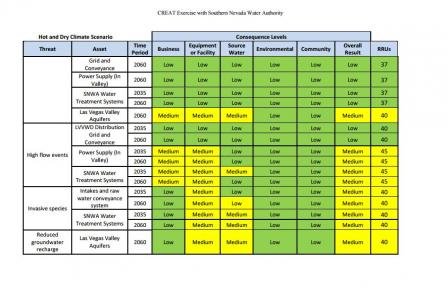Southern Nevada Water Authority Assesses Vulnerability

Southern Nevada Water Authority (SNWA) is a cooperative of seven water and wastewater agencies that serves more than two million residents in Nevada, including the city of Las Vegas. SNWA worked with the EPA to conduct a vulnerability assessment of the Las Vegas service area that considered hazards and impacts and vulnerabilities in two future scenarios (in 2035 and in 2060). Projected impacts included hotter and drier summers, drought conditions, and increased algal blooms.
This vulnerability assessment also helped identify more than 60 potential current and future actions to take in response to and prepare for changing environmental conditions. SNWA followed up this initial analysis with more in-depth assessments of water source availability that considered changing environmental conditions, population, and water demand projections. These assessments provided SNWA with a better understanding of its risks and potential vulnerabilities. The information also informed the water authority’s ultimate consideration, selection, and implementation of appropriate strategies for preparedness and resiliency.
SNWA continues to anticipate, prepare, and plan for the future as a member of the Water Utility Climate Alliance, a consortium of 10 of the largest water utilities around the country actively engaged on how environmental conditions are changing.
How Did They Do It?
- Identified projected risks and assessed utility vulnerability - With guidance from EPA, SNWA analyzed a range of future projections and potential impacts on drinking water, wastewater, and stormwater utilities for the Las Vegas area (through 2035 and through 2060).
- Utilized asset/threat pairings to identify and select “adaptation packages” of applicable strategies - Projections helped identify the most vulnerable assets and assess the facility assets against their respective threat. These asset/threat pairings were used to help identify potential cost-effective preparedness strategies.
- Developed short- and long-term threat resiliency strategies - The asset/threat pairings analysis identified both preparedness and resiliency actions scaled to the magnitude of scenario risk. For example, resiliency strategies for the short- and long-term threat from harmful algal blooms included:
- Improving and increasing modeling for water quality and temperature.
- Altering water treatment process or extending source water intake levels deeper.
- Identified initial assessment limitations and the need to conduct further analysis before implementing adaptation strategies - SNWA understood the limitations of the first study and undertook a follow up analysis that used refined scenarios, included more locations, and encompassed greater focus on water availability and quality concerns (e.g., dissolved oxygen, turbidity, and mixing). Hydrologic and Water Quality System can provide a more in-depth modeling platform to estimate future impacts on water quality and pollutants.
Similar Cases and More Information
- For more case studies from Water Utility Climate Alliance Members, see the Tampa Bay Water case studies.
- For more information about ensuring available water supply in the future view the Anacortes, WA case study.
- For other cases working to ensure water quality under projected impacts view the Pennsylvania Natural Resources Adaptation Plan.
- To better understand how occurrences of harmful algal blooms can be affected by various environmental conditions, view the Harmful Algal Blooms & Climate Change Factsheet (3 pp, 173 KB, About PDF).
References

